This riveting exploration of Elijah in the Bible reveals the prophet's challenging journey and enduring lessons on faith and divine power.
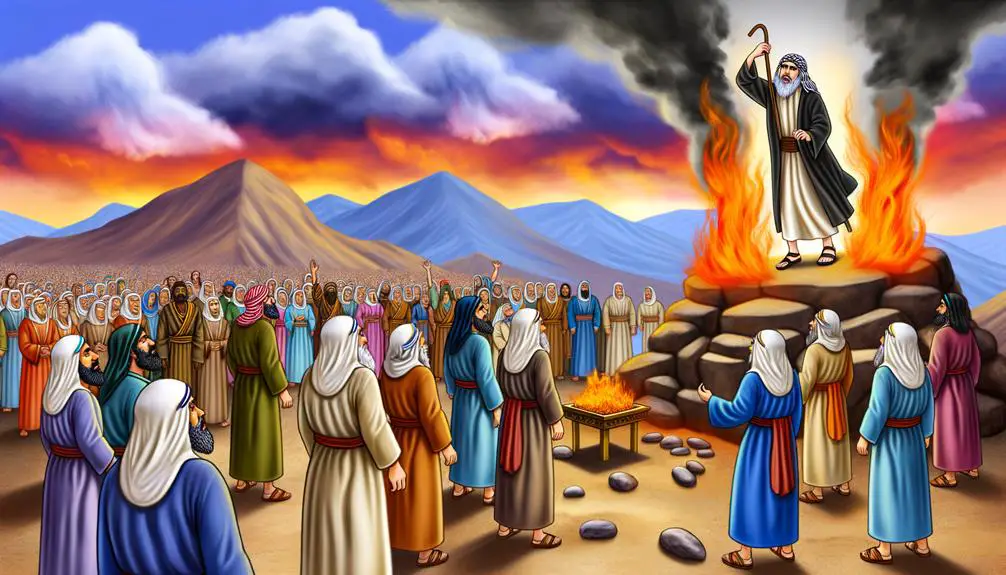
Elijah in the Bible Story and Lesson
Elijah's life in the Bible is a complex interplay of faith, power, and prophecy. Born in Tishbe, you'd find his resilient nature essential for the divine missions ahead. His stark confrontations, especially with King Ahab, exemplify unwavering commitment to truth amidst rampant idolatry and corruption. Perhaps most compelling is the Mount Carmel contest, a critical display of Yahweh's supremacy over Baal, shaping theological discourse. Yet, his moments of despair post-triumph reveal a poignant side, challenging his perceptions and deepening his faith. As you explore Elijah's ascent and enduring legacy, you'll uncover layers that define prophetic tradition and divine justice.
Key Takeaways
- Elijah confronted King Ahab, challenging the widespread corruption and idolatry in Israel.
- The Mount Carmel contest proved Yahweh's supremacy over Baal through divine fire.
- Elijah's despair post-Carmel highlights the vulnerability and resilience in his prophetic journey.
- His ascension into heaven symbolizes the culmination and divine approval of his ministry.
- Elijah's legacy continues to inspire faithfulness and courage in speaking truth to power.
Early Life and Calling

Elijah's early life and divine calling, though sparsely detailed in the scriptures, critically shaped his prophetic mission in the context of Israel's complex religious landscape. Emerging from Tishbe in Gilead, a region marked by rugged terrain, you can see how his origins might have contributed to his stern, resilient character—a necessary attribute for a prophet. The scriptures focus less on his formative years and more on the profound divine encounters that defined his prophetic identity. These encounters aren't merely narrative flourishes; they are theological affirmations of his role as God's mouthpiece.
His calling is particularly significant, revealed through the dramatic and direct communication from God. This divine interaction is not only a call to service but also an empowerment for the challenging tasks ahead. It's in these moments that Elijah's identity as a prophet is both forged and affirmed. The divine encounters serve as a clear demarcation from a simple man of faith to a pivotal prophetic figure, tasked with the reformation of Israel's spiritual ethos.
Understanding these elements about Elijah helps you appreciate the complexity of his role and the weight of his mission. Each divine encounter didn't just shape him; they propelled him into the public, religious sphere, equipped with an unshakeable conviction and authority.
Confrontation With King Ahab
One of the most pivotal moments in Elijah's career was his bold confrontation with King Ahab, which epitomized the prophet's challenge to the prevailing corruption and idolatry in Israel. This intense encounter, marked by prophetic courage, underscores a critical turning point not only in Elijah's life but also in the spiritual landscape of Israel.
As you explore the complexities of this confrontation, it's crucial to grasp that Elijah was not merely a lone prophet voicing discontent. He was the embodiment of divine justice, confronting not just a king, but a systemic departure from ethical and religious adherence to Yahweh. Elijah's audacity to challenge King Ahab directly was a profound demonstration of his unyielding commitment to God's commands.
Analyzing the narrative, you'll see that Elijah's approach was confrontational yet necessary. He didn't simply accuse Ahab; he presented a theological challenge that highlighted the consequences of Ahab's actions on Israel. This encounter illuminates the dynamics of power, prophecy, and piety, showing that true prophetic ministry involves risking everything to speak truth to power.
Through this act of confrontation, Elijah did not just speak words; he staked his life on the divine promise of justice and righteousness. His fearless stance makes this episode a cornerstone in the study of prophetic ministry in the Hebrew Bible.
The Challenge on Mount Carmel
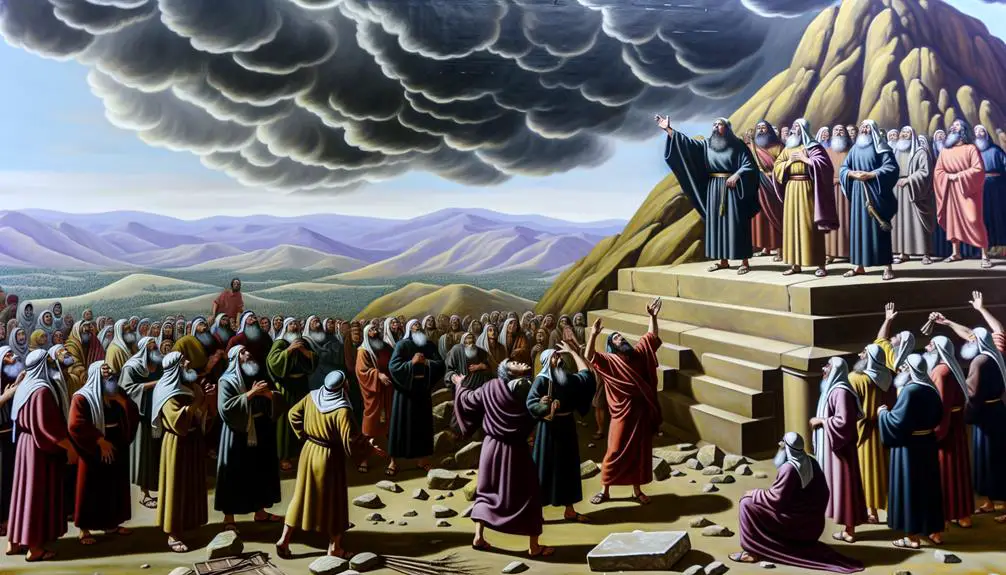
Mounting the challenge on Mount Carmel, Elijah orchestrated a dramatic public contest to demonstrate Yahweh's supremacy over the Baal worshippers. With the kingdom of Israel deeply entrenched in polytheistic practices under King Ahab's rule, Elijah's challenge was not merely a spectacle but a pivotal moment of theological assertion. He proposed that both he and the 450 Baal prophets each build an altar and prepare a bull for sacrifice, leaving the ignition of the fire to divine intervention. This test was designed to prove whose deity truly wielded power.
As you consider the proceedings, it's essential to note Elijah's strategic patience and confidence. He allowed the Baal prophets the first attempt. Despite their fervent prayers and rituals from morning till noon, their pleas for divine fire remained unanswered. Their failure was palpable, marked by desperation as they leaped wildly around their altar.
In stark contrast, Elijah's subsequent actions underscored his faith and tactical mastery. After repairing the Lord's altar with twelve stones representing the tribes of Israel, he drenched his sacrifice in water thrice, intensifying the challenge. His simple, fervent prayer sufficed. The response was immediate and awe-inspiring: divine fire fell, consuming the water-soaked offering and even the stones and dust, decisively affirming Yahweh's dominance in this iconic confrontation.
Moments of Despair and Revelation
Following the triumphant display on Mount Carmel, Elijah faced profound moments of despair that precipitated important revelations about his faith and mission. You'll find that after such a public victory, Elijah's sudden flight into the wilderness under Jezebel's threat marks a stark contrast, revealing the vulnerability and humanity in his prophetic role. This pivot in Elijah's narrative is vital, as it underscores the oscillation between triumph and fear, confidence and doubt within his spiritual journey.
In this wilderness phase, your understanding of divine encounters and personal growth expands as Elijah experiences God not in the grandiose wind or earthquake, but in a gentle whisper. This encounter on Mount Horeb, where God's presence is revealed in subtlety, challenges and reshapes Elijah's previous understandings of divine interaction. You're shown that divine encounters aren't always monumental but can occur through quiet moments that invite deep introspection.
Such experiences contribute significantly to Elijah's personal growth. They teach resilience and a renewed dependence on God's guidance rather than on the prophet's own strength. This period of despair doesn't just test Elijah; it fortifies his faith, preparing him for the continuance of his mission, illustrating how personal trials are intricately woven into the fabric of spiritual evolution.
Ascension and Legacy
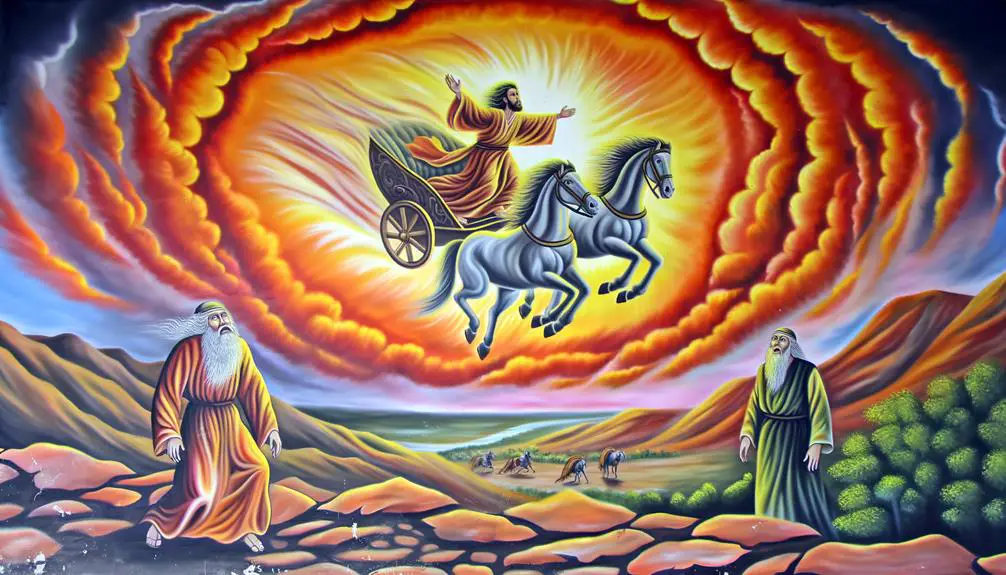
Elijah's ascension into heaven in a whirlwind, as witnessed by Elisha, marks a profound culmination of his earthly ministry and sets the stage for his enduring spiritual legacy. This Miraculous change wasn't merely a spectacular exit but a pivotal theological event, symbolizing the seamless transfer of divine authority from Elijah to Elisha. The scene, dramatic and potent, involves a Divine chariot of fire and horses of fire, emphasizing the supernatural aspect of Elijah's ministry and its continuation through Elisha.
You'll see that this event isn't just about a prophet ascending; it's a deliberate reaffirmation of faith amidst the Israelites. The ascension prefigures other biblical 'taken up' narratives, enriching the typology of salvation history. As a scholar, you'd appreciate how this narrative doesn't isolate Elijah but integrates him into a broader theological context, suggesting an eschatological dimension where Elijah is expected to return as a precursor to the Messiah.
Therefore, the legacy of Elijah, encapsulated in his ascension, extends beyond his temporal existence. It serves as a theological anchor in prophetic traditions, reinforcing the continuity of God's salvific plan through the prophets. This story, thus, isn't just historical; it's a perpetual reminder of divine fidelity and prophetic mission.
Frequently Asked Questions
How Did Elijah Influence Modern Religious Practices?
Elijah's influence on modern religious practices is seen in prophetic symbolism and spiritual mentorship, shaping how you interpret divine messages and guide spiritual growth, reflecting his legacy in contemporary faith expressions.
Are There Any Archaeological Findings Linked to Elijah?
No direct archaeological findings, such as Elijah's relics or prophetic artifacts, have been definitively linked to Elijah. Therefore, your understanding of his historical impact relies heavily on textual rather than physical evidence.
What Is Elijah's Role in Other Religious Texts?
You'll find Elijah's role weaving through various texts, revealing prophetic parallels and interfaith interpretations. His legacy transcends boundaries, offering a rich tapestry of insight across different religious landscapes, deeply analyzed in scholarly circles.
How Do Different Denominations View Elijah's Miracles?
You'll find that denominations vary in their miracle interpretation of Elijah's acts, focusing differently on their prophetic significance and what they symbolize about faith and divine intervention in human affairs.
What Are the Artistic Depictions of Elijah Through History?
Ironically, you'd expect static imagery, yet Elijah's artistic representations showcase a vivid iconographic evolution. These depictions, rich in symbolic interpretations, reflect the dynamic nature of his perceived roles across various historical periods.

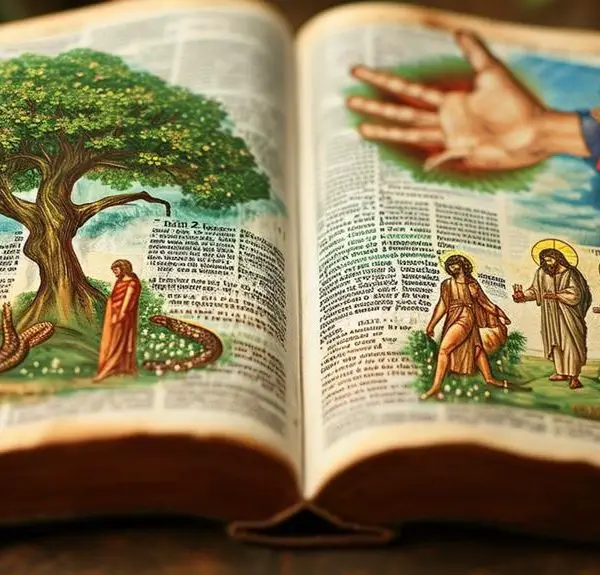
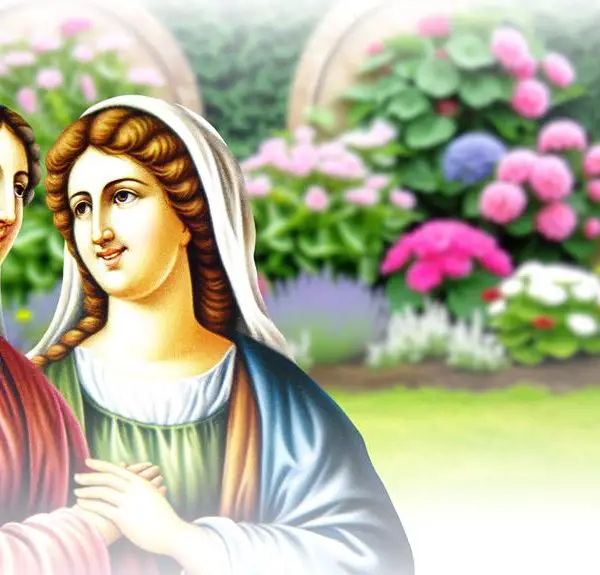
Sign up